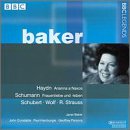| All Artists: Hugo Wolf, Richard Strauss, John Constable, Geoffrey Parsons, Paul Hamburger, Janet Baker Title: Baker Sings Haydn, Schumann, Schubert, Wolf, R. Strauss Members Wishing: 0 Total Copies: 0 Label: BBC Legends Original Release Date: 1/1/1968 Re-Release Date: 10/10/2000 Album Type: Original recording remastered Genres: Pop, Classical Styles: Vocal Pop, Opera & Classical Vocal, Historical Periods, Classical (c.1770-1830), Modern, 20th, & 21st Century Number of Discs: 1 SwapaCD Credits: 1 UPC: 684911404920 |
Search - Hugo Wolf, Richard Strauss, John Constable :: Baker Sings Haydn, Schumann, Schubert, Wolf, R. Strauss
 | Hugo Wolf, Richard Strauss, John Constable Baker Sings Haydn, Schumann, Schubert, Wolf, R. Strauss Genres: Pop, Classical |
Larger Image |
CD Details |
CD ReviewsExtraordinary! 06/10/2003 (5 out of 5 stars) "Janet Baker was probably the finest singer produced by the UK, and she is in remarkably fine fettle here: passionate, expressive, fulsome, even expansive. Her live performances as captured here have little of the finicky-ness of some of her studio recordings, but have greater staying power as a result. The Frauenliebe is rivalled only by Brigitte Fassbaender's extraordinary recording, and certainly eclipses Baker's two studio recordings of the cycle. Do yourself a favor and bathe in this one. It's glorious!" BAKER'S DOZEN OR SO DAVID BRYSON | Glossop Derbyshire England | 09/15/2005 (5 out of 5 stars) "What a wonderful place the BBC's archive of recorded music must be. This time they have allowed us to hear some of the great Dame's work from 1968 and 1970 at the Aldeburgh festival and from their own studios. Baker was in her prime around then, and I certainly have to agree with the somewhat gushing liner-note that we can hear her at her very best on this disc. The selection itself greatly appeals to me. I already owned Schumann's Frauenliebe cycle (given in full here) done by von Otter, and also Wolf's Spanish songbook from Schwarzkopf and Fischer-Dieskau out of which she gives us two numbers, so it is fascinating now to own Baker's versions of these. I expect shortly to own the complete Strauss songs from Fischer-Dieskau, but the two Schubert songs are completely new to me, the other two Schumann songs may or may not be, and although I have heard Haydn's Arianna before it's not something one hears each time one turns on the radio, and I welcome it also as a new treasure in my collection.
Despite having the `atmosphere' that comes from a live session, the Aldeburgh items are less vivid on account of the recording. It's not bad by any means, but the piano sound is rather heavy, and this bothers me just slightly in the Frauenliebe songs and unslightly in the Haydn. This composition is a chamber cantata with piano accompaniment giving us the anguished sentiments of Ariadne as she longs successively for Theseus and for death. It takes rather over a quarter of an hour, dividing in roughly equal parts into two `recitatives' and two arias, the `recitatives' being more what we would usually call scenas. There is some lovely and committed singing from Dame Janet here, as indeed there also is in the Schumann. Dame Janet does not choose to sock the latter to us in the way von Otter characteristically does, and I shall always have a particular fondness for von Otter's exuberant Er der Herrlichste, but I can take it done with a little more maidenly decorum as well, and Baker is outstanding is the grief-laden final song. I just wish that the recording had had a little more immediacy about it. That lack is rectified in the BBC's studio recordings, and they give us a chance to hear Baker in full voice. The recording may still not be quite up to 2005 standard, but it should not bother anyone either. Schubert, Schumann, Wolf and Strauss all find the singer right at the top of her form, and the piano is distinctly better treated by the recording. I wonder how many of Schubert's 606 songs I actually know, but the theoretical maximum before hearing this recital was 604. The two here are high-quality Schubert, and Der blinde Knabe is actually a translation of Cibber's tear-jerker The Blind Boy, which many will recall from our schooldays. The translation is by one Craigher, and I don't know whether this is the author of the poem to a more famous Schubert masterpiece The Young Nun, although I suppose that's likely. No texts are provided, and the liner-note is an exasperating string of platitudes and ooh-ah. One reads `These performances give unalloyed pleasure'. Says who, pray? My pleasure is a little alloyed by the recording at Aldeburgh, if I may say so. We also learn `What singles out Dame Janet's interpretations...is a complete identification with each piece...' Is this saying that no other singer does that, and if not what (if anything) is it saying? Nevertheless I remain grateful to the BBC for this superb disc. It's an exhibition disc, letting us hear one great singer and artist at her best, and that does not dispose me to make laborious comparisons. Amid their preoccupations with charters, licence-fees, management restructuring, efficiency drives, digital television and other earthly concerns I hope fervently that they will continue to build up their golden treasury and to keep sharing it with the rest of us." |
